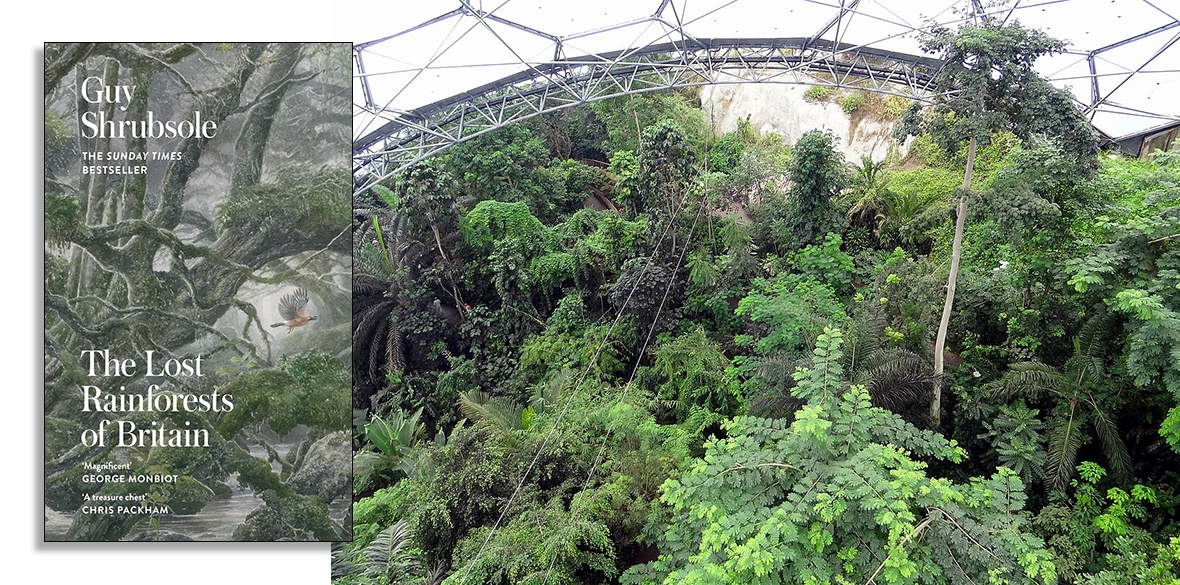This is the last article you can read this month
You can read more article this month
You can read more articles this month
Sorry your limit is up for this month
Reset on:
Please help support the Morning Star by subscribing here
The Lost Rainforests of Britain
by Guy Shrubsole
William Collins, Paperback, £10.99
ON the surface, The Lost Rainforests of Britain is a gripping investigation of Britain’s biogeography, but there are revelations and wonders within its murky depths.
The first eye-opener is that “Britain’s version of the rainforests” is not peat bogs or chalk streams; our equivalent of the tropical rainforest is scattered shreds of damp and shady temperate rainforest in south-west England, Wales, the Lake District and the west of Scotland.
The book begins with the serendipitous discovery of a temperate rainforest near Dartmoor, its branches “dripping with mosses, festooned with lichens, liverworts and polypody ferns.” Guy Shrubsole’s investigations – revealing that these woodlands once covered around a fifth of Britain – prompt a search for similar places. After centuries of human mismanagement, few have survived.
Shrubsole draws on science, history, storytelling and – notably – his own experience of researching and campaigning in the spheres of conservation, rewilding and access to land. It is a narrative of loss and jeopardy; a requiem for places and ways of connecting with nature.
Exploration of this hidden and half-forgotten aspect of Britain’s landscape is splendidly poetic but firmly grounded in rational argument. There is a refreshing rejection of self-indulgent spirituality and shallow allusions to personal growth in Shrubsole’s reflections on the obliteration of wild places and their ecosystems. His contention that a lethal interaction of commerce and carelessness is resulting in rapid and significant erasures – of flora, fauna, culture and human experience – is established through data, comparison and concrete examples.
The notion of a causal connection between environment and cognitive factors, such as mental health and creativity, is more complex – and perhaps unprovable – but is supported by credible circumstantial evidence. One of the book’s interviewees, a farmer committed to rewilding, dismisses “woo-woo hippy talk” and highlights the restorative power of woodlands through his collaboration in research with Loughborough University.
Shrubsole establishes a clear timeline of annihilation – from Stone Age hunter-gatherers in a desperate battle for survival, to landowners turning a profit in the 20th century. The “stunted oaks” of temperate rainforests have been cleared for large-scale agriculture and to make way for taller, faster-growing and more economically viable conifers.
The book yields some genuine surprises. I was aware of the role of sheep in demolishing oak saplings; but I was astonished to learn that rhododendron bushes have been choking the life from British rainforests since their introduction in 1763.
Shrubsole’s relentless exposure of the greed, ignorance and folly that led to the deforestation of Britain is matched by a merciless account of the consequences. The loss of temperate rainforests denies us a natural means of combating the climate crisis: carbon is extracted and stored in tree trunks, branches and leafmould on the forest floor. And there could be an even greater cost. Britain’s rainforests support “a dizzying variety of gorgeous life-forms”: the loss of these pockets of fecundity from our nature-depleted county would, the author argues, cause irreversible damage to the web of life upon which we all depend.
In addition to these tangible calamities, the book anticipates the cultural and psychological costs of this destruction. Its forays into the myths and literature inspired by Britain’s rainforests – touching on the work of Wordsworth, Tolkien and Conan Doyle – are credible and enthralling; but the chapter on the Welsh fables collected in the Mabinogion is splendidly representative of Shrubsole’s eclectic approach. He links the strangeness of these ancient stories to the awe and wonder inspired by the rainforests of Wales, and makes a persuasive case for rewilding as a means of re-enchanting the human imagination.
Having identified what we’re about to lose and why it matters, Shrubsole sets out an array of solutions – cultural, governmental and personal. These are based on two premises. Firstly, since we are no longer hunter-gatherers, short-term approaches to the management of natural resources cannot be justified in terms of the survival imperative. Secondly, calling time on the clearance of trees is a necessary, but not sufficient measure. Nothing less than a strategy based on concerted restoration of woodlands to pre-human conditions will stave off the floods, wildfires and mass extinctions threatened by our climate crisis.
The author’s outrage is tempered with optimism. He is confident that programmes of public education can combat “nature blindness” by raising awareness of botany in general and temperate rainforests in particular. In addition, he believes campaigning can end the “shifting baseline syndrome” that has led to acceptance of ecological loss up to the present time. Finally, he encourages all of us to hold politicians to account for the protection and restoration of our trees and forests.
Shrubsole’s quest to explore and appreciate Britain’s remaining temperate rainforests is absorbing, provocative and stimulates a wealth of additional reading. Given the dangers posed by the loss of these eerily beautiful woodlands, it should also inspire us to take positive action.











